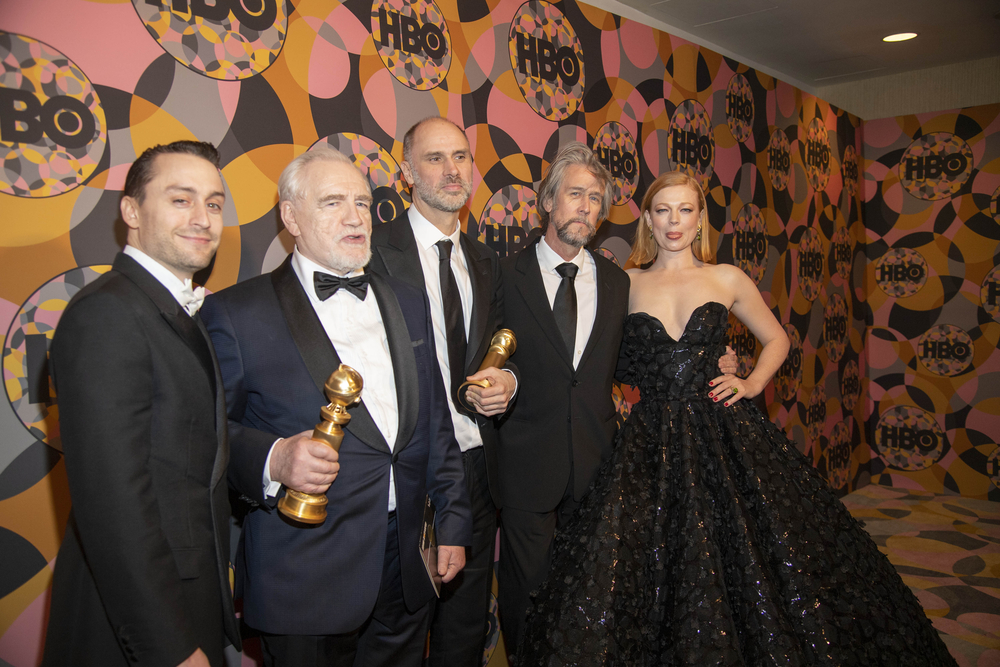Succession, one of the most popular recent additions to HBO’s stable of prestige dramas, dominated the drama category at the 2020 Emmys. But despite critical acclaim, the show inspired complicated and even unpleasant emotions in viewers. Equal parts pleasure and disgust contribute to Succession’s allure, and if articles like “How embarrassed should you be about your ‘Succession’ crush?” are any indication, guilt is the price fans often pay for their investment.
The Roys are a treacherous and amoral clan of one-percenters dominated by aging patriarch Logan Roy, a media mogul who made his fortune disseminating right-wing propaganda through a FOX-esque news network. The central conflict of the show, as its title suggests, is who will inherit his sprawling media empire. The main contenders are Logan’s three children, recovering drug-addict Kendall, cunning political analyst Shiv, and wisecracking playboy Roman. Other possibilities include various cronies and extended family members, like Greg, an unpolished (and impoverished) Roy cousin who stumbles into the family’s orbit in search of a job.
The closer we get to the family, the more our discomfort grows. We’re drawn in by Kendall’s perpetual sadness and vulnerability, Roman’s darkly funny sense of humor, and Shiv’s resentment at being passed over in favor of her brothers. We can’t help but identify with and even pity them, but our identification is constantly challenged by the wickedness of the Roy family. In the show’s first episode, Roman invites the young son of a staff member to participate in the family’s baseball game. When he seems reluctant, Roman writes out a check for one million dollars, offering it as a prize if the kid can hit a home run. Of course, he gets tagged out just inches away from home base. Roman rips up the check with a flourish and offers the boy a fragment, or a “quarter of a million dollars,” as he puts it. In his review of the show, writer Jorge Cotte asks if “As viewers, do we separate our ethical concerns from the conniving and calloused amorality of the Roys’ business machinations? This is related to another question: is there something suspect in feeling for these fictional power brokers who are so similar to those causing actual harm and systemic violence in the world?” In other words, how can we identify with the child and the spoiled billionaire taunting him at the same time?
The show’s engagement with wealth and privilege offers no clear moral perch for the viewers to situate themselves upon. The show seems to set up bumbling and well-intentioned Greg as an alternative to the Roys, yet he is purposefully difficult to identify with. His scenes, though invariably funny, are excruciatingly awkward. He can never read a room, and always seems to take up too much space. But over the course of the series, he proves to be as mercenary and self-serving as his cousins, illustrating the impossibility of achieving affluence without dirtying one’s hands. In Succession, we are never allowed to rest too comfortably in one place. The audience is situated everywhere at once, ricocheted from viewpoint to viewpoint.
This discomfort is built into the very fabric of the show. The camera is usually handheld, and its gaze feels shaky and restless. When characters move from one location to another, we often see them from a distance, as if through the perspective of the paparazzi. In this way, Succession borrows much from Veep, another show filmed in a mockumentary style without in-fiction justification. In Veep, the handheld camera is used for comedic purposes. It allows for quick reaction shots and zooms, which provide extra flair to jokes. But in Succession, the effect is disorienting, even nauseating. While the mockumentary style usually suggests verisimilitude, here it suggests voyeurism and instability. There is a fundamental clash between how the Roys see themselves and how they are perceived by the world, or on another level, a clash between how they perceive themselves and how the audience perceives them. We learn that as children, Kendall frequently locked Roman in a dog cage and made him eat kibbles. Roman insists that this was sadistic torture, but Kendall insists that Roman enjoyed it too. Storytelling is central to this family, which made its fortune spinning yarns, but even the Roys can’t agree on their own narrative.
Critic Rachel Syme points out that “While Succession does not glorify wealth, it also makes no apologies for it. The Roys are not like you and me. They have SoHo lofts and trust funds and cashmere everything, and they own theme parks and movie studios and shady cruise lines . . . They have everything anyone could want, but they are all empty and lonesome, neglectful and neglected.” Syme describes the ambiguity at the heart of the show, an ambiguity that is mirrored in audience reactions. While we may cheer them on, we derive equal pleasure from watching them fail. As a character from an equally rich but far more old-money family tells Kendall in season two, “Watching you people melt down is the most deeply satisfying activity on the planet.” The amoral world of Succession allows for both disgust and identification, which is perhaps a more honest way of depicting the rich and famous than complete disavowal or complete worship.


